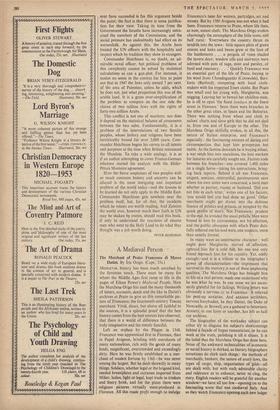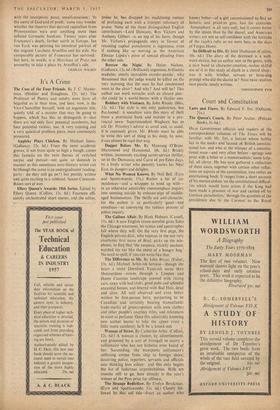A Mediaeval Person
The Merchant of Prato: Francesco di Marco Datini. By Iris Origo. (Cape, 35s.) MEDIEVAL history has been much enriched by the feminine touch. There must be many for whom the Middle Ages first came to life in the pages of Eileen Power's Medieval People. Now the Marchesa Origo has used the many thousands of letters, accounts, deeds and the like in Datini's archives at Prato to give us this remarkable pic- ture of Francesco, the fourteenth-century Tuscan merchant. Vivid, direct, but above all faithful to the sources, it is a splendid proof that the best history comes from the best sources best observed; that there is a world of difference between the truly imaginative and the merely fanciful.
Left an orphan by the Plague in 1348, Francesco was apprenticed first in Florence, then in Papal Avignon, bristling with merchants of many nationalities, rich with the goods of many lands, magnificent, overcrowded and exceedingly dirty. Here he was firmly established as a mer- chant of modest fortune by 1361—he was never among the largest. But he dealt shrewdly in many things. Soldiers, whether legal or the brigand kind, needed breastplates and cuirasses imported from Milan; ladies, light or legal, kept trade in trinkets and finery brisk, and for the pious there were religious pictures virtually mass-produced in Florence. All this made profit enough to indulge
Francesco's taste for women, partridges, art and money. But by 1380 Avignon was not what it had been. Francesco returns to Prato, where life then, as now, meant cloth. The Marchesa Origo evokes charmingly the atmosphere of the little town, still half rural : 'Everywhere the country thrust its tendrils into the town : little square plots of green onions and leeks and beans grew at the foot of the battlements , . . a pergola of vines shaded the tavern door; window sills and stairways were adorned with' pots of sage, mint and parsley, of basil and rosemary. . . .' Quickly Francesco was an essential part of the life of Prato, buying in his wool from Chondisgualdo (Cotswolds), Buri- forte (Burford), competing with local cloth- makers with his imported Essex cloths. But Prato was small and his young wife, Margherita, was nagging. Leaving her to bewail her childless state, he is off to open 'the finest fondaco in the finest street in Florence.' Soon there were branches in the other great cities, in Spain and the Balearics. There was nothing from wheat and cloth to sailors' charts and slave girls that he did not deal in, from one end of Europe to the other. The Marchesa Origo skilfully evokes, in all this, the nature of Italian enterprise, and Francesco's especially : the fascinating mixture of daring and circumspection that kept him prosperous but stable. As the famine descends he is buying.wheat, a war sends him into munitions, the best markets for luxuries are carefully sought out. Factors rode between his branches—one covered 1,400 miles on a single horse—taking his instructions, bring- ing back reports. Behind it all was Francesco, exigent, anxious, mistrustful; parsimonious save where his own tastes were concerned, a hard man whether as partner, master or husband. 'Did you not bite in each letter,' writes one of his factors, 'you would feel you had done no good.' Other merchants might get drawn into the dubious finance of politics and princes, or, tempted by the quick profits of usury. Not Francesco ; prudent to the end, he avoided the usual pitfalls.'Men were bound to him by convenience, not by affection, and the public obsequies with which Prato duti- fully ushered out his soul were, one suspects, more than usually formal.
In many ways an unattractive character : well might poor Margherita, starved of affection, upbraid him for a cold fish, his one and only friend reproach him for his cupidity. Yet, oddly enough—and it is a tribute to the biographer's power of characterisation—the impression that surviveg.in the memory is not of these unpleasing qualities. The Marchesa Origo has brought him to life as a real person, made one understand why he was what he was. In one sense we are neces- sarily grateful for his failings. Writing letters was obviously a nervous tic to Francesco : it relieved his pent-up anxieties. And anxious scribblers, nervous busybodies, be they Datini, the Duke of Newcastle, or Boswell, are a godsend to historians. Anxiety, in one form or another, has left us half our archives.
The biographer of the workaday subject can either try to disguise his subject's shortcomings behind a facade of bogus romanticism, or he can work at the truth, polishing it till it shines. It is the latter that the Marchesa Origo has done here. None of the awkward technicalities of economic or social history is shirked, as literary biographers sometimes do shirk such things: the methods of merchants, bankers, the nature of usury laws, the
types of cargo, ship, organisation of gilds—all are dealt with, but with such admirable clarity and relevance as to enhance, never to clog, the story. English readers will be grateful for another window—we have all too few—opening on to the fascinating scene that was mediaeval Italy. And as they watch Francesco opening each new ledger
with the inscription, pious, unselfconscious: 'In the name of God and of profit,' some may wonder whether the theories that derived capitalism from Protestantism were ever anything more than inflated Germanic bunkum. Twenty years after Francesco's death, farther north in Europe, Jan van Eyck was painting his itimortal portrait of the migrant Lucchese Arnolfini and his wife. No comparable picture of Francesco has survived : but here, in words, is a Merchant of Prato not unworthy to take a place by Arnollini's side.
WIL,ON



































 Previous page
Previous page